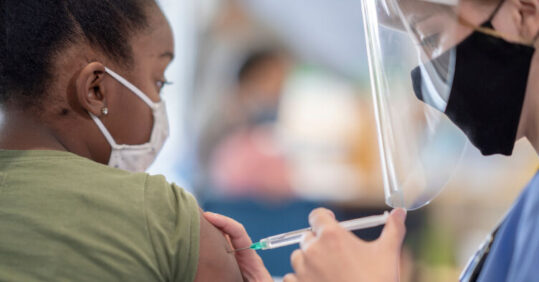Concerns school nursing ‘disinvestment’ contributing to fall in vaccine uptake

An ongoing disinvestment in school nursing and a rising absenteeism among school children have been cited as potential causes of falling levels of vaccination uptake among young people.
Uptake of the adolescent vaccines offered to young people in school year 9 during the 2021/22 academic year has fallen, and government officials are concerned this is leaving many unprotected from life-threatening diseases.
Data by the UK Health Security Agency this week showed 7% fewer 13-to-14-year-olds in Year 9 were vaccinated against meningococcal disease, diphtheria, tetanus and polio, than the year before, and around 20% less were vaccinated than when compared with pre-pandemic levels.
Public health leaders have told Nursing in Practice of the ongoing challenges that they fear are compounding the situation.
Sharon White, chief executive of the School and Public Health Nurses Association, said that falling school attendance could be behind the ‘worrying’ vaccination data, as school nurses were no longer able to chase students who miss their jab appointments.
Related Article: New preceptorship package for social care nurses
She also said that disinvestment in school nursing, the loss of confidence in vaccines and the impact of antivaxxers during Covid-19 had a part to play.
Ms White recognised the impact of school closures during the pandemic on vaccination rates, but also stressed that the return to school after Covid-19 had put an ‘inordinate demand’ on the time and resources of schools.
This had left ‘less room to accommodate immunisation teams and less time to devote Personal, Social, Health and Economic education (PHSE) to sessions about immunisation’, she added.
In addition, Ms White also pointed to falling attendance levels among students and a lack of school nurses to chase up missing students as part of the problem.
Ms White said that ‘tenacious’ school nurses used to be able to follow up with absent pupils to notify GPs and offer alternative immunisation sessions, but now pressure on staff meant this was often not possible.
‘Covid left many school nurses unfit to continue working,’ added Ms White, who said many also took early retirement or went to different careers away from nursing and healthcare following the pandemic.
The focus of school nurses currently was around complex safeguarding and mental health issues, ‘leaving very little time for prevention and health education’, which is critical to increasing uptake in vaccinations, she said.
Related Article: Applications to study nursing in England at ‘new low’
Meanwhile, Helen Bedford, Professor of child health at University College London Great Ormond Street Institute of Child Health, said that these figures were ‘a cause for concern but not surprising given the disruption caused to school vaccination services before and after the pandemic’.
She highlighted issues around Covid-19 lockdowns and subsequent school closures, as well as staff and pupil sickness rates.
‘It is also reported that 100,000 children have never returned to school after the pandemic and these young people in particular, will miss out on routine vaccination offered in school,’ said Professor Bedford.
Meanwhile, Dr Vanessa Saliba, consultant epidemiologist at UKHSA, said: ‘In recent years we have seen vaccine uptake fall due to the challenges posed by the pandemic.
Related Article: Paul Rees appointed as permanent NMC chief executive and registrar

See how our symptom tool can help you make better sense of patient presentations
Click here to search a symptom




